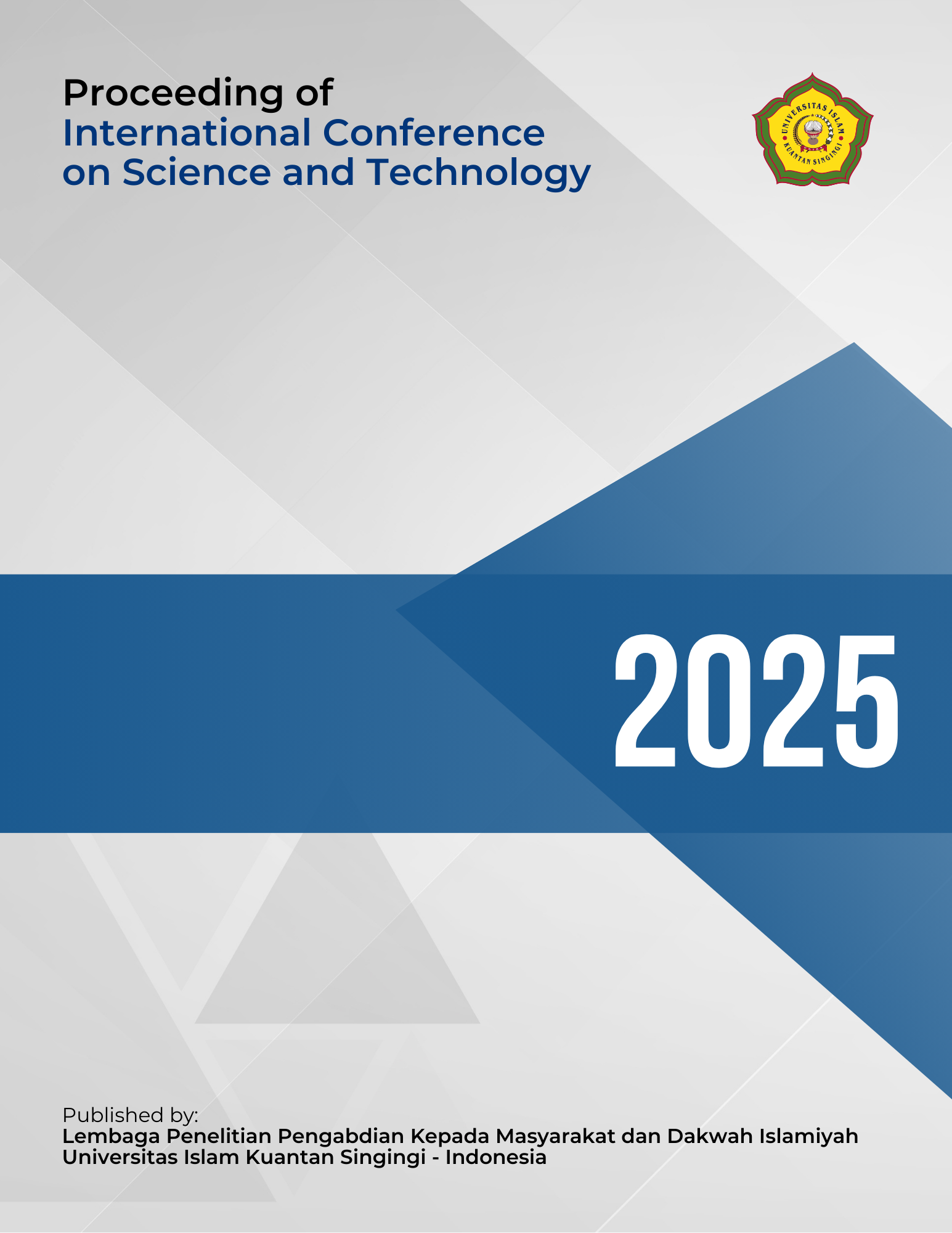Strengthening the Sharia Economic Ecosystem Through Technology Innovation Based on Maqashid Sharia
Abstract
Amid the rapid global digitalization, the Islamic economy faces an epistemic paradox: technology is advancing rapidly, yet maqāṣid as an ethical and normative framework has not fully guided the direction of its innovation. Although various digital platforms such as fintech, blockchain, and artificial intelligence have been adopted in the Islamic financial system, there is still no conceptual framework that systematically integrates maqāṣid principles into the design and implementation of technology. This absence creates an ethical void and a risk of directional disorientation in the development of the digital sharia economy ecosystem. This article aims to formulate an integrative maqāṣid-tech framework as an ethical and strategic foundation for strengthening the Islamic economy ecosystem in the era of digital innovation. With a reflective qualitative approach based on literature study, this article examines the potential synergy between maqāṣid values (protection of wealth, life, intellect, and others) and digital transformation in the context of Sharia transactions, management of zakat and waqf, and the expansion of inclusive finance. The study results show that technological innovation, if designed within the framework of maqāṣid, not only addresses the challenges of Sharia compliance but also strengthens public trust, system efficiency, and the sustainability of the Sharia economy. This article proposes the Maqāṣid-Tech Model as a transformative framework for building an Islamic economic ecosystem that is not only digitally adaptive but also deeply rooted in the values of maslahat and justice.
Downloads
References
[2] Ahmad Hendra Rofiullah. (2025). Pengembangan Ekonomi Syariah dalam Perspektif Maqashid Syariah di Era Ekonomi Digital. SAUJANA : Jurnal Perbankan Syariah Dan Ekonomi Syariah, 7(2), 24–43.
[3] Alemu, M. D. (2024). Financial Technology ( FinTech ), Artificial Intelligence ( AI ), ICT , Institutional Quality , and Financial Sector Development : International Evidence. 1–21.
[4] Arif, M., Subli, M., Hikmah, N., & Al-Mustla, S. D. (2024). Penerapan Maqosid Syariah Dalam Pembentukan Hukum Era Digital: Regulasi Cryptocurrency. Al-Mutsla, 6(2), 298–310. https://doi.org/10.46870/jstain.v6i2
[5] Fata Habibullah, Akhlis Fatikhul Islam, Diva Carrisa Putri, Zhella Annisa, & Rachma Indrarini. (2024). Investasi Digital dalam Perspektif Syariah. Ekonomi Keuangan Syariah Dan Akuntansi Pajak, 1(4), 88–108. https://doi.org/10.61132/eksap.v1i4.555
[6] Fitriana. (n.d.). Relevansi Prinsip Bagi Hasil Dalam Sistem Ekonomi Islam Modern : Menyikapi Tantangan Keuangan Global.
[7] Kementerian Koordinasi Bidang Perekonomian. (2023). Buku Putih Strategi Nasional: Pengembangan Ekonomi Digital Indonesia 2030. 1–104.
[8] Nofrianto, Ibrahim, A., Kholis, E. A. | N. A. N., & Utami, S. A. (2021). Pengatar Ekonomi Syariah. In Departemen Ekonomi dan Keuangan Syariah - Bank Indonesia.
[9] Nurhidayatullah, A. S., & Fathurohman, O. S. (2022). Maqashid Syariah Sebagai Kerangka Kerja Untuk Inovasi Produk Keuangan Non Bank Dalam Era Digital. Masharif Al-Syariah: Jurnal Ekonomi Dan Perbankan Syariah, 9(5), 3635–3653.
[10] Priyatna, S. E., & Maseri, A. C. (2025). PENERAPAN AI DAN MACHINE LEARNING DALAM PENDIDIKAN ISLAM : TANTANGAN ETIKA DAN PENDEKATAN INTEGRATIF BERBASIS MAQĀṢ ID AL- S Y ARĪ ‘ AH. 10(1), 119–136.
[11] Raainaa, N. A. (2024). Analisis Disrupsi Ekonomi dalam Era Digital dan Implikasinya Terhadap Perubahan Proses Bisnis, Transformasi Keuangan, serta Tantangan Regulasi. Jurnal Ekonomi Revolusioner, 7(6), 62–68.
[12] Sobriyah, S., & Adiman, M. F. (2024). Peluang dan Tantangan Artificial Intelligence (AI) terhadap Pembelajaran Maharotul Kalam. Indonesian Research Journal on Education.
[13] Syamraeni, S., Sholichah, H., & Al fajar, A. H. (2024). Transformasi Nilai Religius di Era Digital: Analisis Literatur Berdasarkan Tujuan Hifz al-‘Aql. Socio Religia, 5(2), 93–109. https://doi.org/10.24042/sr.v5i2.25552
[14] Trizuwani, S., Zen, M., & Ftmawati. (2025). Fintech Syariah dalam mendistribusikan produk keuangan Islam dan meningkatkan kesejahteraan ekonomi umat. Jurnal Ekonomi Dan Perbankan Syariah, 5(1), 744–745.
[15] Veronika, Kartika, H., & Abadi, A. P. (2024). Kemampuan Berpikir Reflektif Matematis Siswa SMP ditinjau dari Jenis Kelamin. EMTEKA: Jurnal Pedidikan Matematika, 5(2), 281–292.
[16] Wafi, I., Akhmadi, F., Ngasifudin, M., & Nurfauzi, Y. (2024). Dampak Penerapan Ekonomi Syariah terhadap Kinerja Keuangan Bank Syariah di Indonesia. Lab, 8(02), 143–159. https://doi.org/10.33507/lab.v8i02.2572
[17] Wahyuni, S., Sapa, N., & Haddade, A. W. (2024). Fintech Keuangan Syariah Dalam Prespektif Sharia Complaince. Jurnal Tabarru’: Islamic Banking …, 7(November). https://journal.uir.ac.id/index.php/tabarru/article/view/18025%0Ahttps://journal.uir.ac.id/index.php/tabarru/article/download/18025/7313
[18] Widjaja, G. (2024). MAQASID SYARIAH DALAM REGULASI FINTECH: Analisis Kritis Kerangka Hukum Ekonomi Islam di Era Digital. Borneo: Journal of Islamic Studies, 5(1), 23–36.
Copyright (c) 2025 Landes Yuanda, Delima Afriyanti, Nurlaili Janati, Ahda Segati, Surya Tegar Widjiantoro, Muhammad Thaariq Asshiiddiq

This work is licensed under a Creative Commons Attribution 4.0 International License.


